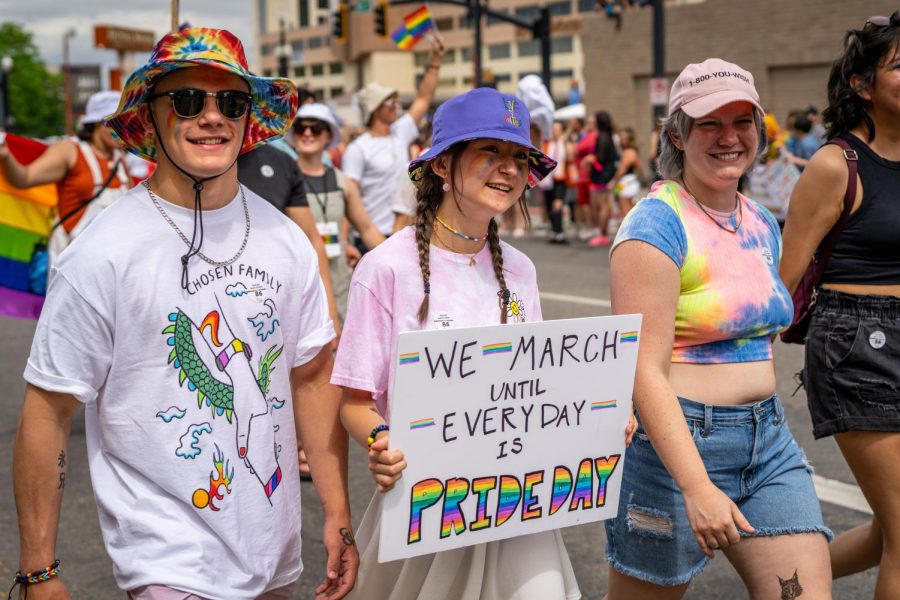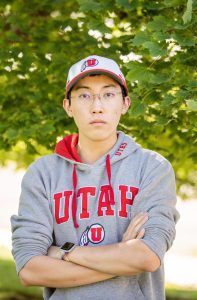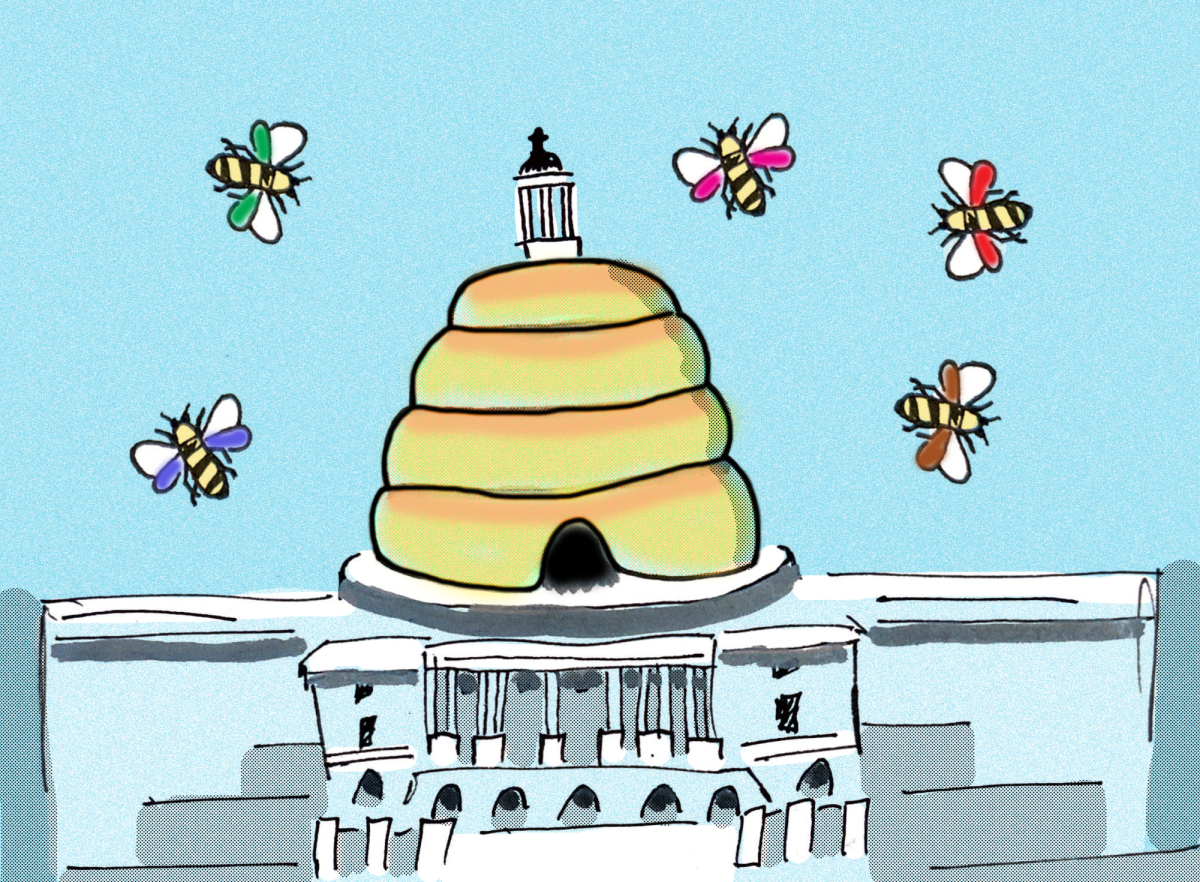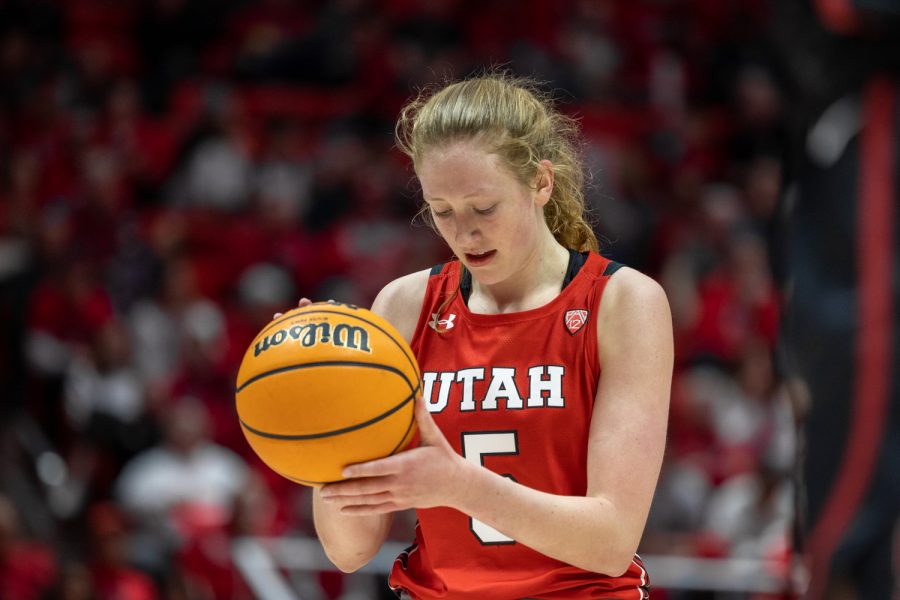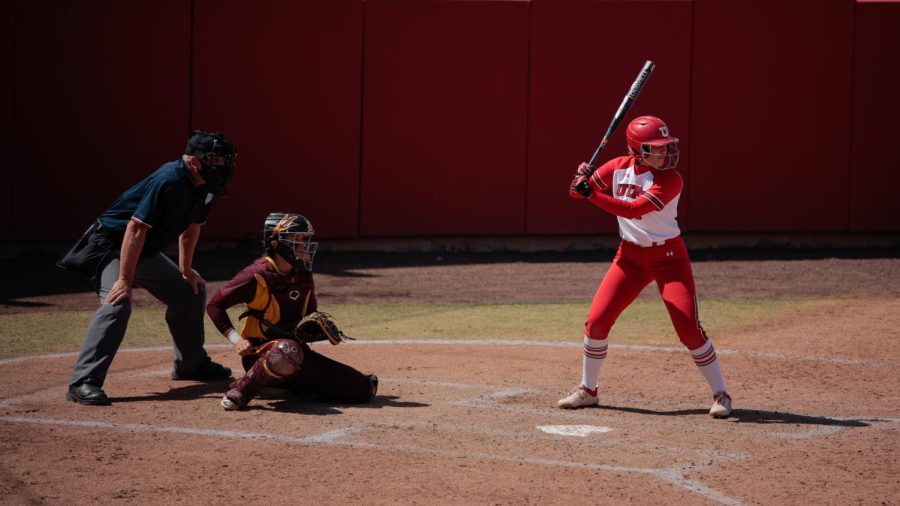UPC Pride Week 2022 Concludes with Parade, Fight Continues for the LGBTQIA+ Community
Participants from the Cougar Pride Center walk down the road at the Pride Parade in Salt Lake City, Utah, on Sunday, June 5, 2022. (Photo by Xiangyao “Axe” Tang | The Daily Utah Chronicle)
June 5, 2022
Tens of thousands of people flooded the streets of Salt Lake City, from 200 South, then along 400 East, ending at 700 South, as part of the Utah Pride Center’s 2022 parade.
The parade was much longer than years past, due to construction along the traditional route and making more room for social distancing.
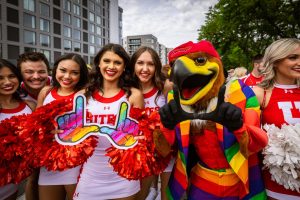
Parade delegations included a variety of school groups, community organizations, local businesses and more. A UTA bus rode by onlookers with “Ride with pride” on its digital display. Walkers gave out candy and stickers to watchers, both young and old.
As Pride originated in a fight against police brutality, the UPC faced backlash for including cops in their parade, not only as safety, but marching alongside other groups as well.
In an interview with the Chronicle, Kevin Randall, the communications manager of the UPC, said the Center empathizes with people who do not feel comfortable having cops at Pride, but they currently “have a good relationship with the police department, and want to maintain that.”
On June 10, Salt Lake Community Mutual Aid will be hosting a Pride without Police event, which celebrates the revolutionary spirit central to the roots of queer liberation movements.
April McCoy, her husband and her three daughters volunteered with the UPC to support their youngest daughter, who is pansexual. The McCoys made Pride a family event, and April said it was the best parade she has seen in her life.
“It really irritates me when people say that respect is earned, not automatically given,” she said. “I think that’s bull crap straight across the board. I think everybody deserves respect. I think everybody deserves to be loved. I think everybody deserves to be appreciated.”
Jp Varney, the program assistant from the University of Utah College of Pharmacy, said to him, pride has a lot of meanings.
“I’ve actually been very involved with the Utah LGBTQ+ community for the past I would say 16, 17 years, and it’s very encouraging to be here,” he said. “To think that Utah is a predominantly religious state, it’s wonderful to see that this much diversity can happen in such a small circle.”
Varney hopes that one day, Pride celebrations will not be out of necessity.
“My dream has always been that … there’ll be no more discrimination, no more hardship, things like that, that we don’t need to have this anymore,” he said. “Right now, it’s a necessity — we need to be here for each other and that’s why we’re doing this.”
“No pride for some of us without liberation for all of us”
After the parade, people could attend a festival in Washington Square for $10 for youth and $15 for adults. There were over 300 exhibitor booths, one of them being U Health, with a highlight on their Transgender Health Program.
Isak Goodwin, a plastic surgeon with U Health, said the program is all-encompassing healthcare, which includes family practice, urology, therapies and more.
“[Pride is] providing access to necessary health care to everyone who needs it, and being here and supporting the community and being visible is super important,” Goodwin said.
Right next to Goodwin’s table were representatives from the U’s LGBT Resource Center, which Mykie Valenzuela, a student staff member, said is a space for students to hang out and safely explore their identities.
This was Valenzuela’s first year being fully out to everyone they know.
“The Resource Center was part of the reason that I kind of was permitted to explore my gender identity in a safe space, and I really appreciate that,” they said. “So like, especially being here, working the booth at the Resource Center during Pride is kind of like an overwhelming experience, but in a good way.”
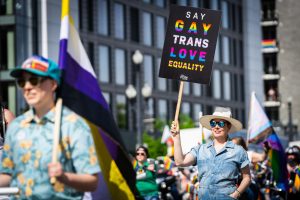
In addition to a celebration, Valenzuela believes Pride signifies a call for continued fighting and change.
Valenzuela took their hat off to reveal a pin with revolutionary trans activist Marsha P. Johnson’s words on it: “No pride for some of us without liberation for all of us,” they read.
“And I really think seeing so many people here, both in the community and our allies, just really gives us an opportunity to kind of take that quote to heart and really like go away with pride, wanting to make change all year and not just like, a couple days a month,” Valenzuela said.
Self-described straight ally Alli Martin has volunteered with the Human Rights Campaign for over 10 years. To Martin, pride means service.
“I think that straight allies need to come out and be of service during Pride so that our queer friends and family can enjoy it and have fun,” she said.
According to Martin, the HRC works to translate policy into law.
“When you look back at Stonewall and the riots that really started this movement off, what HRC is doing is working really hard to protect rights and enshrine them in federal law and protection, which we know especially over the last like four years, administrations change, leadership in our country changes and rights are very fickle,” she said.
As a mother to a transgender child, Martin said with transgender healthcare under threat in certain states, her rights as a mother are threatened as well.
“And so if you don’t see yourself in this movement, then I think that you’re not looking close enough,” she said. “Because when they threaten any of us, they threaten all of us.”


